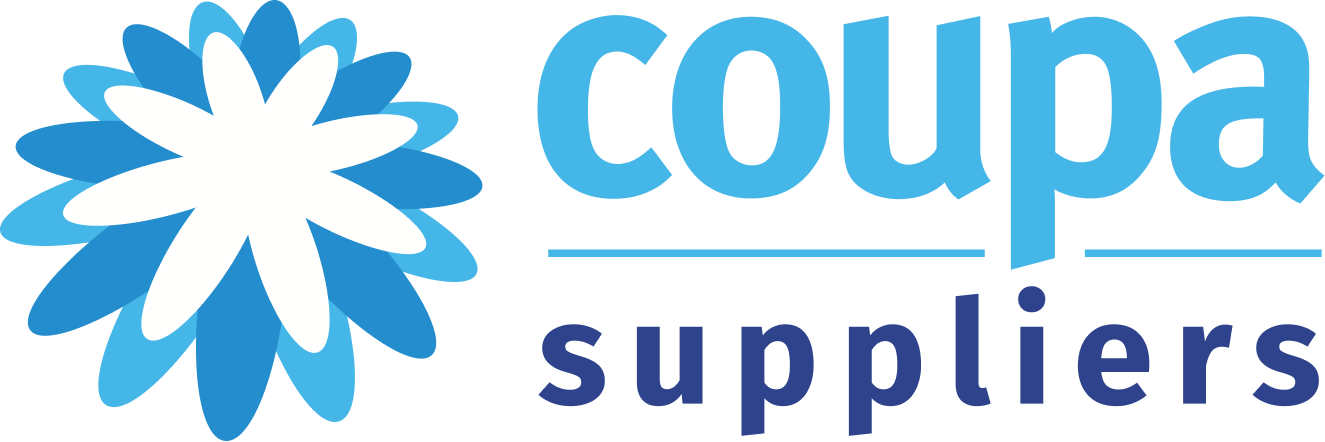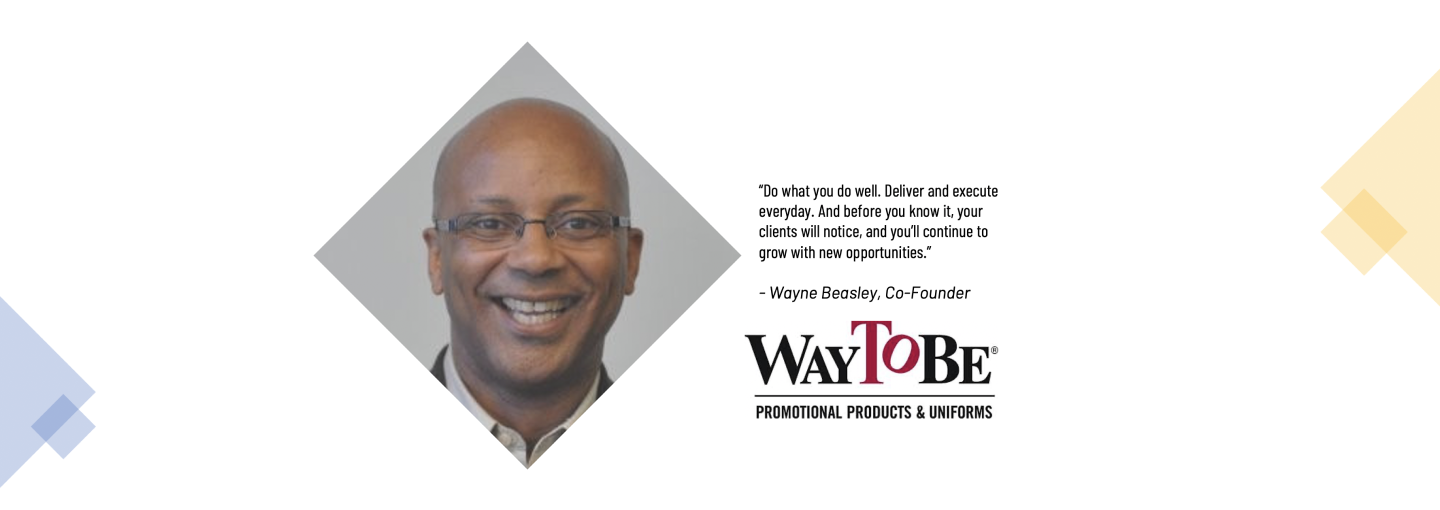From the age of 15, Wayne Beasley yearned to be an entrepreneur. That was his mission in life. He started his career as an accountant in the corporate world, where he met his future business partner, Alan McIntosh. Soon after meeting McIntosh, Beasley traded in his office desk for his car trunk to the dismay of his family. And, as they say, the rest is history.
Beasley is the co-founder of WayToBe Designs, a promotional products and uniform company based in Hayward, California. Beasley is a successful minority small business owner who supplies products to some of the largest companies on the planet, including McDonald’s, Autodesk, NetSuite, Google, YouTube, and Apple.
He started selling t-shirts out of a duffle bag in his car. For several years, he and McIntosh worked the bustling circuit of festivals, flea markets, and concerts. People started referring to them as the T-shirt Guys, and the referrals came pouring in. Beasley’s garage became the warehouse.
They got their first big break when a local McDonald’s franchisee asked them to produce customized T-shirts for his restaurant in San Francisco. Word got out to other restaurants, businesses, and nonprofits, and the company really took off. Beasley and McIntosh graduated from their cars and got a tiny office in South San Francisco. In 1996, they won their first license to provide uniforms to McDonald’s locally. Eventually, they earned the national license to serve the entire global McDonald’s system.
From T-shirts to Super Bowl 50 to a Sesame Seed Bun Blanket?
Beasley and his team earned a reputation as a company that you could depend on from the very beginning. When customers started asking them for promotional products that went far beyond t-shirts, they said, “we can do that.” To meet the growing need, they built a global supply chain complete with a full range of quality merchandise at the best possible prices. In 2016, when the NFL tapped WayToBe for custom promotional products for Super Bowl 50, they had the infrastructure in place. WayToBe did far more than deliver. They delighted the NFL and were recognized as one of the three most valuable suppliers out of the thousands involved in Super Bowl 50.
In 2019, Wayne was approached with a new kind of challenge. For years, the company had been supplying 3000 McDonald’s locations with uniforms. McDonald’s Corporate approached them to support the launch of a new global program called McDelivery for 14,000 stores. All of the products had to be custom made. No off the shelf water bottles or baseball caps. They wanted sesame seed bun blankets, pillows shaped like French fry boxes, and boxer shorts decorated with hamburger images. It was a global program that required creativity, a diverse supply change, and mastery of international delivery and customs regulations’ intricacies. Beasley acknowledges that it was a stretch for the team, but ultimately, everything got to where it needed to be when it needed to be there.
Agility and Humility: The Secrets to Success for a Small Business
Today, the company employs 32 people and operates out of a larger office than the original in South San Francisco. In the early days, Beasley describes his role as “the hustler.” He had to do whatever was necessary to get and deliver the order. He took the calls, created designs, packed the orders, made deliveries, and stood in a booth for hours. And faced lots and lots of rejection. He recalls, “That phase toughened us up and taught us to ask questions and continually learn. Why did we lose? What could we do better? What would have changed the outcome?”
Now, Beasley has evolved to “the manager” role. He is responsible for inspiring employees with a range of skillsets and personalities. He is focused on how to align the team so that they can innovate and execute consistently. One thing has not changed over the years. The commitment to do whatever it takes to deliver. “In the beginning, all we had was our word. On a grander scale now, that is still all we have; it is just that the stakes are higher. We always want to deliver for our clients and make sure that we’re protecting their brand, and coming through for them their teammates.”
While COVID has forced the team to work remotely, Beasley stresses that their commitment to excellence is as strong as ever. “We’ve had to pivot. There are no big live events right now. Our clients have asked to provide different services. For some, we are putting merchandise in kits and delivering them to individual homes. It’s a different process. We’ve evolved to meet the new needs of our customers while maintaining our standards.”
The Benefits of Being A Diverse Business
Both Beasley and McIntosh are African American business owners who have embraced minority certification opportunities. Beasley explains that it was a client who introduced them to certification. “It was in 1999 or 2000 when a client asked us if we were a minority-owned company? We answered, of course, we are. They said, great, let’s see your certification. At the time, we didn’t know about certification. We just were trying to operate a business and deliver. Once we realized it was something that our clients needed, it was important to us. We took all the steps to apply and submit documentation.”
Beasley explains that certification is far more than a verification tool. “Larger companies are seeking partnerships with businesses that understand and look like their customers and workforce. Increasingly those suppliers are minority-owned and operated,” Beasley continued. “Diverse business brings new ideas. They think outside of the box because they have always operated outside of the box. These businesses are also typically smaller and more agile. They don’t need to go through layers of approvals to test out a new idea. They can move faster and operate with less risk.”
On the other side of the coin, Beasley explains there are many challenges to running a small minority-owned business, including lack of skillset, opportunity, or intellectual capital. “Funding can be one of the toughest. Alan and I learned early on the benefits of having good personal credit. Some people we come across don’t know that. They are held back and have to work even harder to gain the confidence of the lenders. Because we had good credit, we were able to get a $100,000 SBA loan that was critical to helping us expand.”
Beasley is committed to helping other small, diverse business reach their potential. He serves on the Coupa Diversity Advisory Board and is part of the Coupa Inclusion Initiative. “I chose to join the Initiative because it is intentional, specific, and measurable. It’s not just a PR or ad campaign. Coupa is committed to creating programs to help small and medium-sized business leaders succeed and lift their communities for the long term.” Beasley emphasizes that the initiative provides access to experts, best practices, and advice around HR, logistics, marketing, and operations. “If I had access to this kind of information when I was starting, it would have made things much easier for me. I urge fellow minority business owners to take advantage of these tools and mentors.”
Despite the current market challenges, Beasley is optimistic about the future. His advice to fellow entrepreneurs is simple, “Focus on your strengths and continue to strengthen them. Recognize and work on improving your weaknesses. Focus on being small, and don’t try to be all things to all people. Do what you do well. Deliver and execute every day. And before you know it, your clients will notice, and you’ll continue to grow with new opportunities.”
We hope this story inspired you! If you have a success story you would like to share, write to us.

